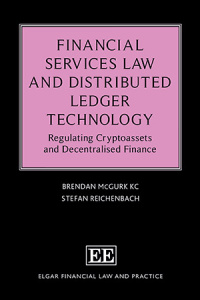Hardback
Financial Services Law and Distributed Ledger Technology
Regulating Cryptoassets and Decentralised Finance
9781035300877 Edward Elgar Publishing
This incisive book examines the extent to which existing UK financial service regulations can be applied to digital assets and decentralised financial services provided by distributed networks. Brendan McGurk and Stefan Reichenbach consider the wider legal issues beyond regulatory enforcement, attributable to the use of distributed ledger technology based financial services.
More Information
Contents
More Information
This incisive book examines the extent to which existing UK financial service regulations can be applied to digital assets and decentralised financial services provided by distributed networks. Brendan McGurk and Stefan Reichenbach consider the wider legal issues beyond regulatory enforcement, attributable to the use of distributed ledger technology based financial services.
Key Features:
• Comprehensive examination of the nature and application of distributed ledgers in the context of financial services
• Analyses the proprietary nature of cryptoassets and their amenability to financial services regulation as a form of property
• Detailed consideration of the extent to which existing financial services law governs cryptoassets and forms of decentralised finance
• Sector specific analysis of the use of digital assets as securities, within the distributed payment systems, and in supporting lending and insurance services
• Consideration of the complexities in identifying the appropriate jurisdiction and applicable laws governing crypto disputes
• In-depth exploration of the remedies and dispute resolution methods available to holders of digital assets
Discussing the benefits and risks associated with the application of DLT, this informative book will be fundamental for financial services practitioners, including solicitors, barristers, and in-house counsel, as well as industry specialists operating within the decentralised finance sphere. It will also be beneficial for academics and researchers in finance and banking law, and technology, media, and telecommunications law.
Key Features:
• Comprehensive examination of the nature and application of distributed ledgers in the context of financial services
• Analyses the proprietary nature of cryptoassets and their amenability to financial services regulation as a form of property
• Detailed consideration of the extent to which existing financial services law governs cryptoassets and forms of decentralised finance
• Sector specific analysis of the use of digital assets as securities, within the distributed payment systems, and in supporting lending and insurance services
• Consideration of the complexities in identifying the appropriate jurisdiction and applicable laws governing crypto disputes
• In-depth exploration of the remedies and dispute resolution methods available to holders of digital assets
Discussing the benefits and risks associated with the application of DLT, this informative book will be fundamental for financial services practitioners, including solicitors, barristers, and in-house counsel, as well as industry specialists operating within the decentralised finance sphere. It will also be beneficial for academics and researchers in finance and banking law, and technology, media, and telecommunications law.
Contents
Contents:
1 Introduction to Financial Services Law and Distributed Ledger Technology
PART I THE NATURE AND USE OF DISTRIBUTED LEDGER
TECHNOLOGY IN FINANCIAL SERVICES
2 Blockchain and distributed ledger technology
3 Digital assets and the token economy
4 The application of DLT in financial services: Benefits and use cases
5 Risks and the regulatory issues arising from the use of DLT
PART II THE FINANCIAL SERVICES REGULATORY FRAMEWORK
6 Financial services regulation Part 1: The proprietary status of cryptoassets
7 Financial services regulation Part 2: The regulated activities
8 Financial services regulation Part 3: Other applicable provisions
PART III REGULATING SPECIFIC USE CASES
9 Regulating trade in securities tokens
10 Cryptoassets in payments and payment services
11 Crypto lending platforms
12 Decentralised insurance
PART IV JURISDICTION AND REMEDIES
13 Jurisdiction and applicable law
14 Dispute resolution and remedies
15 Conclusion: Regulating distributed ledger technology through financial services law
1 Introduction to Financial Services Law and Distributed Ledger Technology
PART I THE NATURE AND USE OF DISTRIBUTED LEDGER
TECHNOLOGY IN FINANCIAL SERVICES
2 Blockchain and distributed ledger technology
3 Digital assets and the token economy
4 The application of DLT in financial services: Benefits and use cases
5 Risks and the regulatory issues arising from the use of DLT
PART II THE FINANCIAL SERVICES REGULATORY FRAMEWORK
6 Financial services regulation Part 1: The proprietary status of cryptoassets
7 Financial services regulation Part 2: The regulated activities
8 Financial services regulation Part 3: Other applicable provisions
PART III REGULATING SPECIFIC USE CASES
9 Regulating trade in securities tokens
10 Cryptoassets in payments and payment services
11 Crypto lending platforms
12 Decentralised insurance
PART IV JURISDICTION AND REMEDIES
13 Jurisdiction and applicable law
14 Dispute resolution and remedies
15 Conclusion: Regulating distributed ledger technology through financial services law




